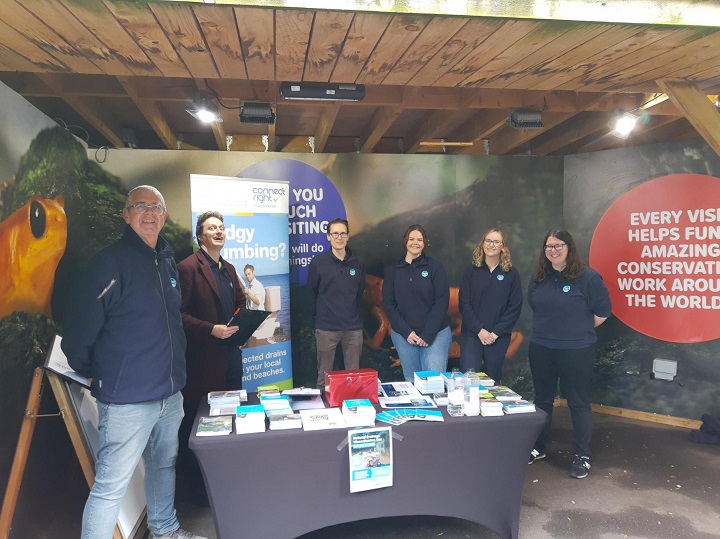- The equivalent of 1.8 Olympic sized swimming pools of wastewater, enters our rivers and streams every day due to misconnected appliances.
- Since 2020, Thames Water has conducted 12,400 misconnection surveys.
- Thames Water, ZSL and local volunteers have since prevented 4,243 misconnected appliances from polluting watercourses across London and the Southeast.
- 89% of property owners rectify the issue before Local Authority involvement.
One in ten properties in the Thames Water region are misconnected. This means, domestic pipes from toilets, showers and washing machines are connected to our surface water drains instead of our wastewater pipes.
Thames Water has spent the day at ZSL’s conservation zoo, London Zoo, as part of ConnectRight’s National Drainage Misconnection Day, explaining to people the importance of identifying misconnections and how property owners can help solve the problem.
All household appliances should be plumbed into the wastewater sewer network, so the water can be taken away and treated. Misconnected pipes from household appliances, allow wastewater to get in to surface water sewers, which are designed to hold rainwater and drain into natural watercourses, damaging the environment and impacting wildlife.
Thames Water works with Local Authorities and the Environment Agency to identify points along rivers and watercourses which may been polluted as a result of a misconnected appliance. Of the 4,243 misconnected appliances found in the last three years, 23% of those were washing machines and 21% were kitchen sinks.
Richard Pumfrett, Thames Water’s environmental protection technical lead, said: “We’re delighted to continue our partnership with ZSL and ConnectRight to spread awareness around the issues of misconnections, which can not only damage the environment, but also lead to extremely expensive repair bills in the long run.
“Most people probably don’t know about the issue of misconnections or that their property may be misconnected. Most misconnections have been done entirely by accident, but we would urge anyone installing a new appliance or fitting new connections to make sure it has been installed properly.”
In partnership with ZSL, Thames Water conduct Outfall Safaris. Since 2017, the Outfall Safaris see volunteers, travel up and down rivers in London and the Southeast to locate, asses and report on polluting pipework. There can be up to 12-35 people in a group.
The Thames Water funded project, has helped raise awareness of the environmental impact caused by misconnected pipes while generating community engagement and interest in local rivers and watercourses.
Joe Pecorelli, conservation project manager at ZSL, said: “It’s vital that we continue to work closely with communities to protect our precious rivers, wildlife and the environment. Our work with Thames Water and local volunteers on Outfall Safari’s has been key in preventing pollution entering our rivers and watercourses.
“The hard work of our volunteers plays a huge role in reducing misconnections, however, there’s still more to do when it comes to improving the health of the river for both people and wildlife. That’s why awareness days and events like today are so important.”
Richard Davies, Chairman of ConnectRight, added: “We’re so pleased that both Thames Water and ZSL are backing ConnectRight’s National Drainage Misconnection Day.
“Today we’re calling on the public to take action, whether that’s signing-up to an Outfall Safari or inspecting plumbing in their own homes. We all have a role to play when it comes to protecting the environment.”
If a pollution is spotted, an extensive investigation then takes place to identify the offending properties. Investigations can consist of property surveys or dye-tracing, which involves putting a teaspoon of colourful dye down sinks, toilets, appliances and drainage gullies. The bright dye shows where wastewater is flowing and helps check homes are properly connected.
Responsibility for fixing misconnections lies with the property owner and failure to do so could result in a fine from your Local Authority. If you believe you’ve located a misconnection, please report this to our contact centre on 0800 316 9800.
About Misconnections
Misconnections happen when toilets and household appliances such as washing machines are incorrectly plumbed to the surface water sewer instead of the foul water sewer for treatment.
This causes problems because:
- The foul water sewer is designed to carry contaminated wastewater to a sewage works for treatment, whereas
- The surface water sewer is designed to carry uncontaminated rainwater directly to a local river, stream or soakaway.
We work with the Environment Agency, local authorities and the local community, to reduce pollution in the rivers and streams across our region caused by misconnected pipes.
Under Section 109 of the Water Industry Act 1991, its unlawful to discharge foul water into a sewer provided for surface water where separate sewers are provided for both foul and surface water.
The property owner is responsible for the repair and maintenance of the wastewater facilities and pipework, within the home and up to the point where the pipework meets the public sewer.

